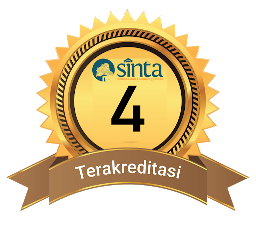Identificication of Implementation Difficulties on Online Learning During The Covid-19 Pandemic To Pre-Service Chemistry Teacher
DOI:
10.29303/cep.v7i1.3644Published:
2024-05-31Issue:
Vol. 7 No. 1 (2024): Edisi Mei 2024Keywords:
Learning difficulties, Pre-service Chemistry Teacher, Online Learning, Covid-19Articles
Downloads
How to Cite
Abstract
This study aims to describe the difficulties of implementation online learning during the covid-19 pandemic to students of Chemistry Education Program at Mataram of University. This type of research is descriptive research with a qualitative approach. The population of this study is 229 students of the Chemistry Education Program at Mataram of University in semester II, IV and VI. The samples were questionnaires and interviews. The result showed that; 1) Learning difficulties in subject considered difficult by students of the Chemistry Education Program at the University of Mataram in the implementation of online learning during the covid-19 pandemic were organic chemistry courses with a percentage of 45%; 2) The highest difficulties faced by students in the implementation of online learning during the covid-19 pandemic were caused by aspect of the student’s socioeconomic conditions with a percentage of 84% in the very high category; 3) The lowest the covid-19 pandemic were organic chemistry courses with a percentage of 45%; 2) The highest difficulties faced by students in the implementation of online learning during the covid-19 pandemic were caused by aspect of the student’s social economic interaction with a percentage of 64% in the high category.
References
Anhusadar, L. (2020). Persepsi mahasiswa PIAUD terhadap kuliah online di masa pandemi Covid 19. KINDERGARTEN: Journal of Islamic Early Childhood Education, 3(1), 44-58.
Aptriyana, J., Lestari, N. D., & Januardi. 2021. Analisis Kesulitan Belajar Siswa dalam Pembelajaran Daring di SMK Se-Kecamatan Kayuagung. Jurnal Promosi Pendidikan Ekonomi UM Metro, 9(2), 86-94.
Arifa, N. V. 2020. Tantangan Pelaksanaan Kebijakan Belajar dari Rumah dalam Masa Darurat Covid-19. Kajian Singkat Terhadap Isu Aktual dan Strategis, 12(7), 13-18.
Cahyadi, I. N., Hartono, F.A., & Sriwahyudewi, I. 2021. Peranan Siswa dalam Meningkatkan Prestasi Belajar Mahasiswa Pascasarjana ISI Yogyakarta. Jurnal Perpustakaan dan Kearsipan, 1(1), 7-14.
Farida, I., Rahmawati, R., Aiyah, R., & Helsy, I. 2020. Pembelajaran Kimia Sistem Daring di Masa Pandemi Covid-19 Bagi Generasi Z. Karya Tulis Ilmiah Masa Work From Home Covid-19 UIN Sunan Gunung Djati, 1-11.
Fauza, N., Ernisawati, & Syaflita, D. 2020. Analisis Kesulitan Belajar Fisika Mahasiswa dalam Jaringan Selama Pandemic Covid-19. Jurnal Geliga Sains, 8(1), 49-54.
Helmi. 2020. Dampak Kondisi Ekonomi Terhadap Kegiatan Pembelajaran Online di SMA Negeri 10 Rejang Lebong. Aghinya Bengkulu. 3(2), 255-260.
Jamaludin, D., Ratnasih, T., Gunawan, H., & Paujiah, E. 2020. Pembelajaran Daring di Masa Pandemi Covid-19 pada Calon Guru: Hambatan, Solusi dan Proyeksi. Karya Tulis Ilmiah, Lembaga Penelitian dan Pengabdian Masyarakat UIN Sunan Djati Bandung, 1-8.
Putri, R. M., Oktaviani, A. D., Utami, A. S., Ni'mutturohmah, & Addina, H. A. 2020. Hubungan Pembelajaran Jarak Jauh dan Gangguan Somatoform dengan Tingkat Stres Mahasiswa UIN Syarif Hidayatullah Jakarta. Indonesian Jounal of Health Promotion and Behavior, 2(1), 38-45.
Putria, H., Maulana, L. H., & Uswatun, D. A. 2020. Analisis Proses Pembelajaran dalam Jaringan (Daring) Masa Pandemi Covid-19 pada Guru Sekolah Dasar. Jurnal Basiedu, 4(4), 862-872.
Ratnawati, E., & Utama, A. P. (2021). Kesulitan mahasiswa dalam pembelajaran daring pada masa pandemi covid-19. Edueksos Jurnal Pendidikan Sosial & Ekonomi, 10(1).
Rigianti, H. A. 2020. Kendala Pembelajaran Daring Guru Sekolah Dasar di Kabupaten Banjarnegara. Elementary School, 7(2), 297-302.
Saragih, M., Silitonga, E., Rohanasinaga, T., & Mislika, M. 2021. Hubungan Dukungan Keluarga dengan Motivasi Belajar Mahasiswa selama Pandemi Covid-19 di Program Studi Ners Fakultas Farmasi dan Ilmu Kesehatan Universitas Sari Mutiara Indonesia. Jurnal Ilmiah Keperawatan Imelda, 7(1), 73-77.
Setiawan, A. R. 2020. Lembar Kegiatan Literasi Saintifik untuk Pembelajaran Jarak Jauh Topik Penyakit Corona Virus-19 (Covid-19). Jurnal Edukatif, 2(1), 28-37.
Slameto. 2003. Belajar dan Faktor-Faktor yang Mempengaruhinya. Jakarta: Rineka Cipta.
Sugiyono. (2017). Metodologi Penelitian kuantitatif, Kualitatif, dan R&D. Bandung: Alfabeta.
Sukaswanto. 2013. Diagnosis Kesulitan Belajar Mahasiswa pada Mata Kuliah Statistika dan Kekuatan Material. Jurnal Pendidikan Teknologi dan Kejuruan. 21 (4): 314 – 324.
Suprapmanto, J., & Utomo. 2021. Analisis Permasalahan Pembelajaran Daring selama Pandemi Covid-19 dan Solusinya. Jurnal Belaindika: Pembelajaran dan Inovasi Pendidikan, 3(2), 15-19.
Author Biographies
Dina Istiana, Universitas Mataram
Jeckson Siahaan, Pendidikan Kimia, FKIP, Universitas Mataram
Eka Junaidi, Pendidikan Kimia, FKIP, Universitas Mataram
Aliefman Hakim, Pendidikan Kimia, FKIP, Universitas Mataram
License
Copyright (c) 2024 Dina Istiana, Jeckson Siahaan, Eka Junaidi, Aliefman Hakim

This work is licensed under a Creative Commons Attribution-ShareAlike 4.0 International License.
Authors who publish with Chemistry Education Practice agree to the following terms:
- Authors retain copyright and grant the journal right of first publication with the work simultaneously licensed under a Creative Commons Attribution License 4.0 International License (CC-BY-SA License). This license allows authors to use all articles, data sets, graphics, and appendices in data mining applications, search engines, web sites, blogs, and other platforms by providing an appropriate reference. The journal allows the author(s) to hold the copyright without restrictions and will retain publishing rights without restrictions.
- Authors are able to enter into separate, additional contractual arrangements for the non-exclusive distribution of the journal's published version of the work (e.g., post it to an institutional repository or publish it in a book), with an acknowledgement of its initial publication in Chemistry Education Practice.
- Authors are permitted and encouraged to post their work online (e.g., in institutional repositories or on their website) prior to and during the submission process, as it can lead to productive exchanges, as well as earlier and greater citation of published work (See The Effect of Open Access).






